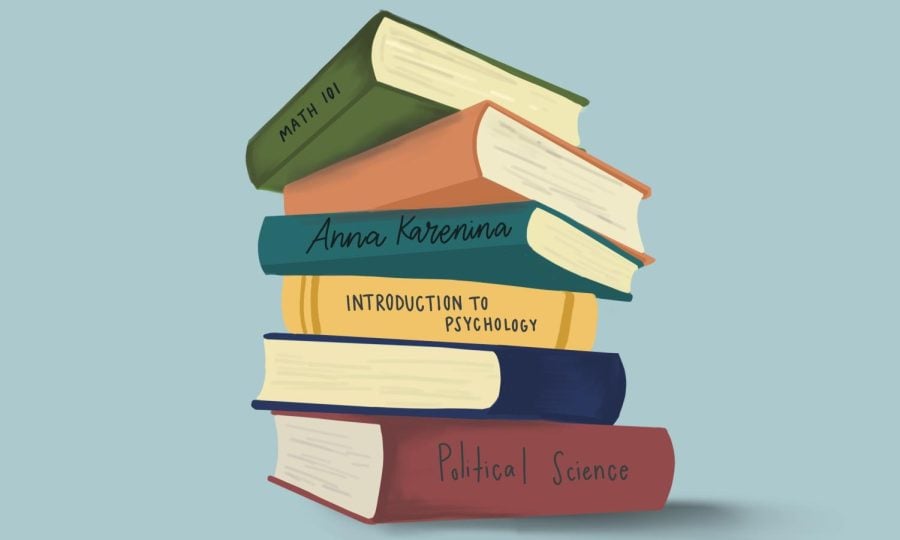Northwestern Libraries approves ASG plan to create “lending library” of donated textbooks for all students
Daily file illustration by Emily Lichty
As of fall 2023, the current Literature and Fine Arts distribution requirement will broaden to Literature and Arts.
January 16, 2023
Northwestern University Libraries administration approved the Associated Student Government’s Academics Committee proposal Wednesday to start a lending library at NU.
The “lending library” — to be set up at either Main Library or Deering Library — will allow students to borrow donated textbooks and other course books. The Academics Committee plans to start collecting books late Winter Quarter and have them available for student use by Spring Quarter.
Weinberg junior and ASG Academics Chair Brian Whetsell said the idea for the lending library emerged following discussions on a potential expansion of the Books for ’Cats program, which provides free course textbooks and materials to students with demonstrated financial need.
Books for ’Cats only applied to freshmen when it was introduced in 2017. It is meant to help eligible first-year students succeed at NU, according to Michael Fitzpatrick, senior director of first-generation and lower-income initiatives at the Office of FGLI Initiatives.
The program has since expanded to include sophomores in Organic Chemistry, Organic Chemistry Lab (CHEM 212, 232, 215 and 235) and all students in “Art Theory & Practice 220-0: Introduction to Painting,” Fitzpatrick wrote in an email to The Daily.
Communication senior and ASG Executive Officer of Justice and Inclusion Jo Scaletty said the organization has been pushing for Books for ’Cats to cover more classes and grade levels for years.
Though Scaletty was financially eligible for Books for ’Cats their freshman year, none of their classes required them to purchase textbooks until their junior year.
“I found myself really struggling, and at times I just wouldn’t buy them and I would just do my best in classes without that information,” they said. “It’s really hampered my education, but I couldn’t afford buying a $300 textbook and groceries.”
Based on ASG’s Fall Quarter 2022-2023 student survey data, there was no significant difference in students’ financial need by school year, said Medill senior and ASG analytics chair Felix Beilin.
Almost 90% of freshmen with high financial need who reported struggling to purchase course materials said the problem persisted past their first-year at NU.
“Being first-generation lower-income is not a one-and-done thing,” Whetsell said. “It’s not an identity that just starts and stops in the transition from high school to college. It’s something that follows you for the rest of your life.”
ASG aims to provide books for a wider range of courses, grade levels and financial need with the lending library. They also want to promote sustainability by reusing students’ old textbooks, according to Whetsell. The lending library will be open to all and operate on an honor system to start, with no formal checkout or return process.
Whetsell said he still hopes Books for ’Cats will expand to address issues the lending library cannot fix, such as covering the cost of all required online resources.
McCormick junior Sam Laughlin said the only issue he had with Books for ’Cats was when the program could not cover required online materials for a physics course; he ended up paying for the online program himself.
Laughlin said if he were still eligible for the program, he would use it for classes where professors do not provide the readings.
“If they could somehow determine for which courses it’s most needed and add those to the eligible list, that’d be really helpful,” he said.
The ASG Justice and Inclusion committee is currently working with the Office of FGLI Initiatives to expand Books for ’Cats to cover more students and classes, Scaletty said.
They added that they will continue to bring students’ firsthand experiences, such as Laughlin’s, to administration to demonstrate the need for the expansion.
“Putting a face to the problem has its own merits,” Scaletty said. “These kids aren’t eating, these kids aren’t able to buy their textbooks. There are real tangible problems that I want to work with (administration) to solve.”
Email: [email protected]
Twitter: @clarezhang_
Related Stories:
— Students raise concerns, suggest more options for Books for Cats initiative
— University launches STEM textbook loan program for low-income students
— ASG Senate discusses reforms for Ethnic Studies programs, Peer-Guided Study Group registration times


